Knack Tutoring connects college students with trained peer tutors. It was founded around 2015 by two students from the University of Florida, and aims to make tutoring “equitable and accessible”. Today Knack is used by dozens of campuses and thousands of students. The platform offers on-demand help from fellow students and even professional tutors. In this article we examine Knack’s reputation and features in depth, compare it to other services, and look at pricing, company details, and user feedback in 2025.
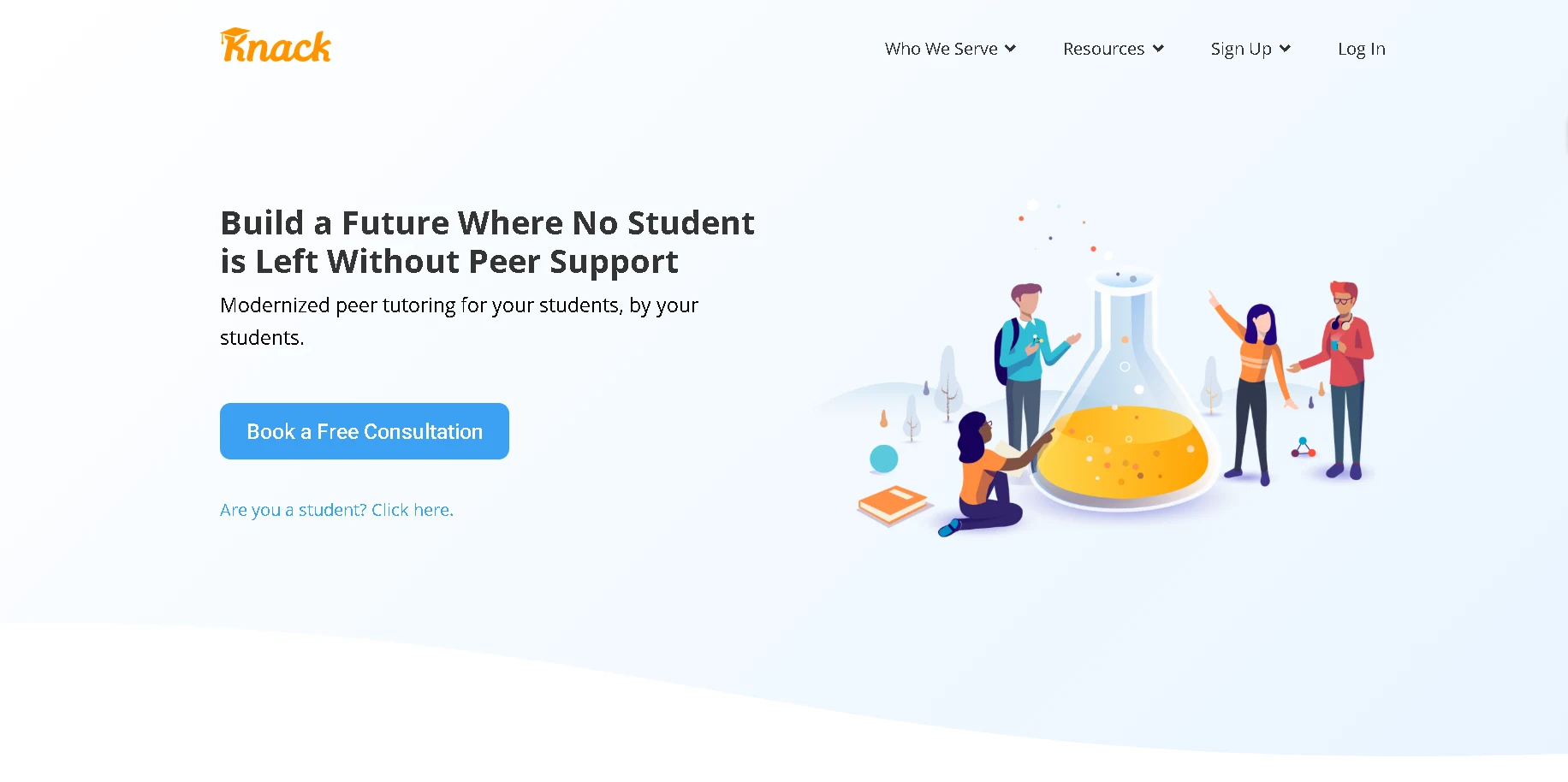
Knack Tutoring Reviews and Testimonials
Knack’s app stores show very high ratings. On Apple’s App Store the Knack app has a 4.8 out of 5 stars from 1.3K ratings, and on Google Play it has 4.6 out of 5 from 99 reviews. These scores suggest users like the app. Official Knack testimonials also praise the service: for example, one student on Knack’s site wrote that “the interface is user friendly and bug free” and that tutors “respond quickly”. Another said Knack is “a free service with tutors that are around my age”, highlighting its accessible peer-based help.
On review sites and forums, feedback is mixed but mostly positive. On Indeed.com (for tutors), Knack has a perfect 5.0 rating from two reviews. Tutors there praise Knack: one said it’s a “good company to work for” with pay on time and responsive support. Another tutor called it “fun and beneficial” with very flexible hours. These comments match other reports that tutors set their own hours and can choose sessions they accept.
Reddit and student forums show both praise and criticism. Some students note that Knack tutors are paid around $14–$15 per hour and that tutoring is free for eligible students. For example, a Kansas State University student explained that Knack offers tutors $14/hr (paid by the school) while students use it at no cost. Others say using Knack can be a “win-win” because the tutor earns money and “it doesn’t cost your friend anything”. On the positive side, many students report good help from their tutors and appreciate the easy app interface.
However, some users have negative experiences. A common complaint is that Knack covers only certain courses or majors at a given college, so it can be hard to find a tutor for every subject. Some tutors mention that they have to do their own marketing to find students. For instance, a student on Reddit said Knack had “only a select few” of his major courses and tutors had to “create your own appeal” to find people to tutor. In a few cases, whole campuses have dropped Knack due to low usage. One parent on an Iowa State forum wrote that Knack tutoring was “completely useless” for their child and the university stopped using it.
Overall, the reviews suggest that Knack is legitimate and widely used, but effectiveness varies by campus. The app ratings and many positive user comments indicate that Knack generally works well when it covers a student’s course. The official stats back this up: Knack reports a 4.94/5 average rating from students and 98.8% of students say their experience was positive. In short, Knack is a real, established service with high user satisfaction, though availability and quality depend on your school and subject.
Knack Tutoring Pricing
Pricing Range
Knack’s pricing model depends on whether a college or school sponsors the tutoring. For most schools that partner with Knack, tutoring is funded by the school. In those cases, students pay nothing and peer tutors earn a fixed hourly rate (often around $14–$15/hr). For example, Marshall University’s Knack program pays tutors $15 per hour. Penny Hoarder also notes that Knack’s partner schools typically pay tutors about $15/hr on average. Tutors used to set their own price under Knack’s original model, with Knack taking a 2.9% commission. But today most tutor payments are set by the school’s program. All figures are in U.S. dollars (USD). Knack doesn’t list general pricing on its website, but its help resources explain how tutor pay is handled.
What Students Say About Pricing
From the student perspective, Knack is often free or very low cost. Knack’s help center states plainly that “Knack tutoring is available at no cost to students who qualify for their school’s program”. Student comments echo this: one tutor said it “doesn’t cost your friend anything” for tutoring, calling it a “win-win”. Because most users on Knack are covered by a free program, there is very little complaint about high prices. In fact, users on Reddit and Quora rarely discuss costs since many people don’t pay anything out-of-pocket. For paid tutoring, $15/hr is much cheaper than typical private tutors (often $30-$50/hr), so if a student did have to pay, they would likely feel it is justified.
Hidden Costs
Knack does not charge any hidden fees. There is no sign-up fee or registration charge, and the service itself is free for qualifying students. Knack’s official policy states that there are no cancellation fees. In other words, you can cancel a session without penalty (though too many no-shows could reduce your privileges). We found no mention of extra charges or add-ons. Everything is included in the program cost. In short, students should not expect any surprise costs beyond what their school covers.
How Pricing Works
Students who use Knack simply request tutoring and, if their school funds the service, they owe nothing. Tutors set their availability and wait for requests. In sponsored programs, when a student books a session, the school’s funding is applied (Knack calls this a “sponsorship” coupon) which overrides the tutor’s listed rate. If a student were to pay out of pocket (in rare cases), Knack would collect payment by credit card in-app. All payments are processed securely by Stripe. Tutors receive each session’s pay through direct deposit to their bank accounts a few days after the session. There are no bundles or subscription packages; it’s simply pay-per-session. Knack does not publicly offer discounts or promo codes, aside from any school-provided funding. If anything, the unlimited tutoring under a flat school fee acts like a built-in discount for students at those campuses.
Free Trial
Knack doesn’t have a separate “trial” period because most students already get the service free through their school. The best approach for a student is simply to sign up and request tutoring to see if your school covers it. For comparison, other tutoring sites offer trials: for example, Chegg gives a 7-day free trial before its subscription begins. But Knack’s model is different – there is no paid trial to start with, since the emphasis is on school-funded peer tutoring.
Refund Policy
Knack’s documentation does not spell out a traditional refund policy for student payments. Its cancellation policy says sessions can be canceled without fee, implying that if a student had paid in advance, they could cancel and be refunded. We found no reports of refund issues in reviews. In practice, since sessions are usually free for students, refunds rarely apply. Tutors receive guaranteed pay after sessions, and we saw no complaints about missed payments on that side. Thus, refund concerns seem minimal. Knack does enforce accountability (too many late cancellations can limit your privileges), but it does not levy any hidden fees or penalty charges.
Knack Tutoring Alternatives
There are several platforms like Knack for online tutoring. Some major alternatives include:
- My Engineering Buddy – A site focused on engineering and STEM help. It offers one-on-one help and homework solutions. My Engineering Buddy emphasizes 24/7 availability and detailed problem walkthroughs. Pricing may be subscription- or pay-per-session based. Tutor quality tends to be high, with many having advanced degrees in engineering. Users find it easy to use for technical subjects and appreciate flexible scheduling.
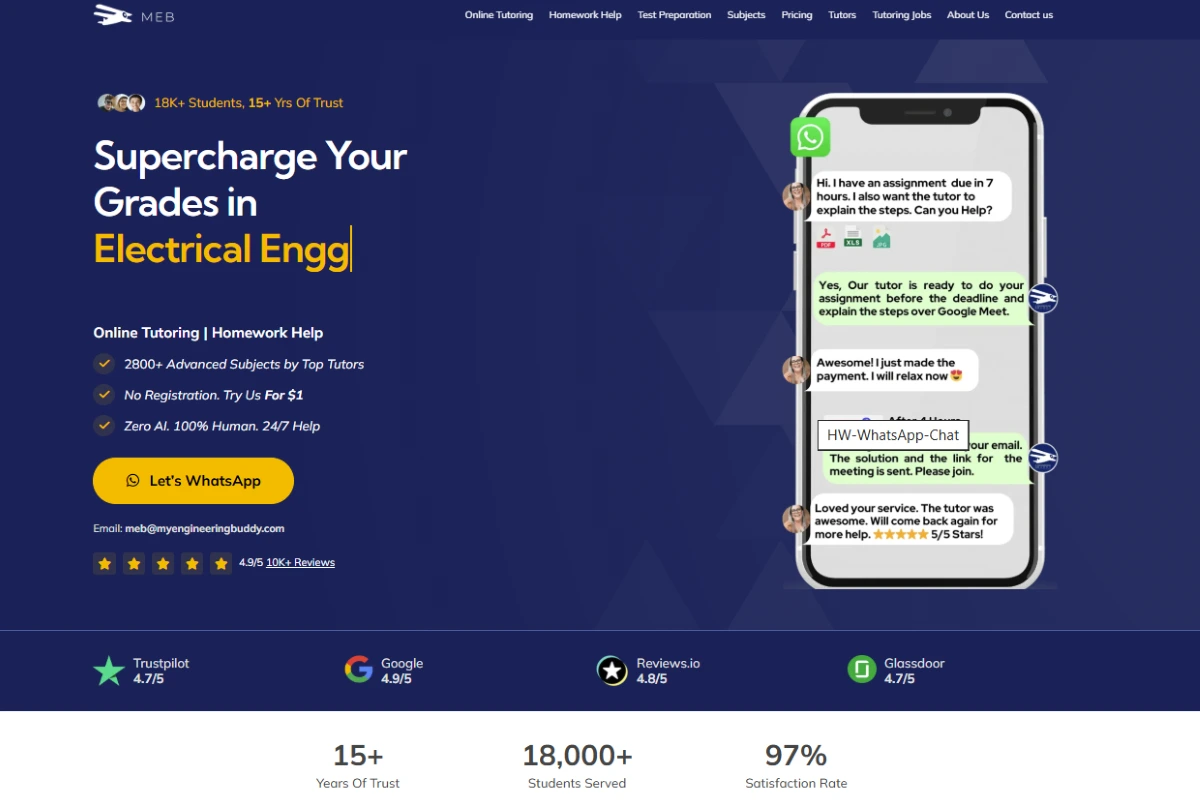
- Wyzant – A large tutoring marketplace in the USA. Tutors set their own rates (often $35–$60 per hour on average, with top tutors charging more). Wyzant offers a 100% “Good Fit” guarantee: the first hour with any tutor is free if you are not satisfied. Users report a wide range of tutor quality, and the site has strong search and matching tools. It supports thousands of subjects, but costs can be higher than Knack’s campus model. Scheduling and paying is straightforward through Wyzant’s site, and many students like the tutor review system.
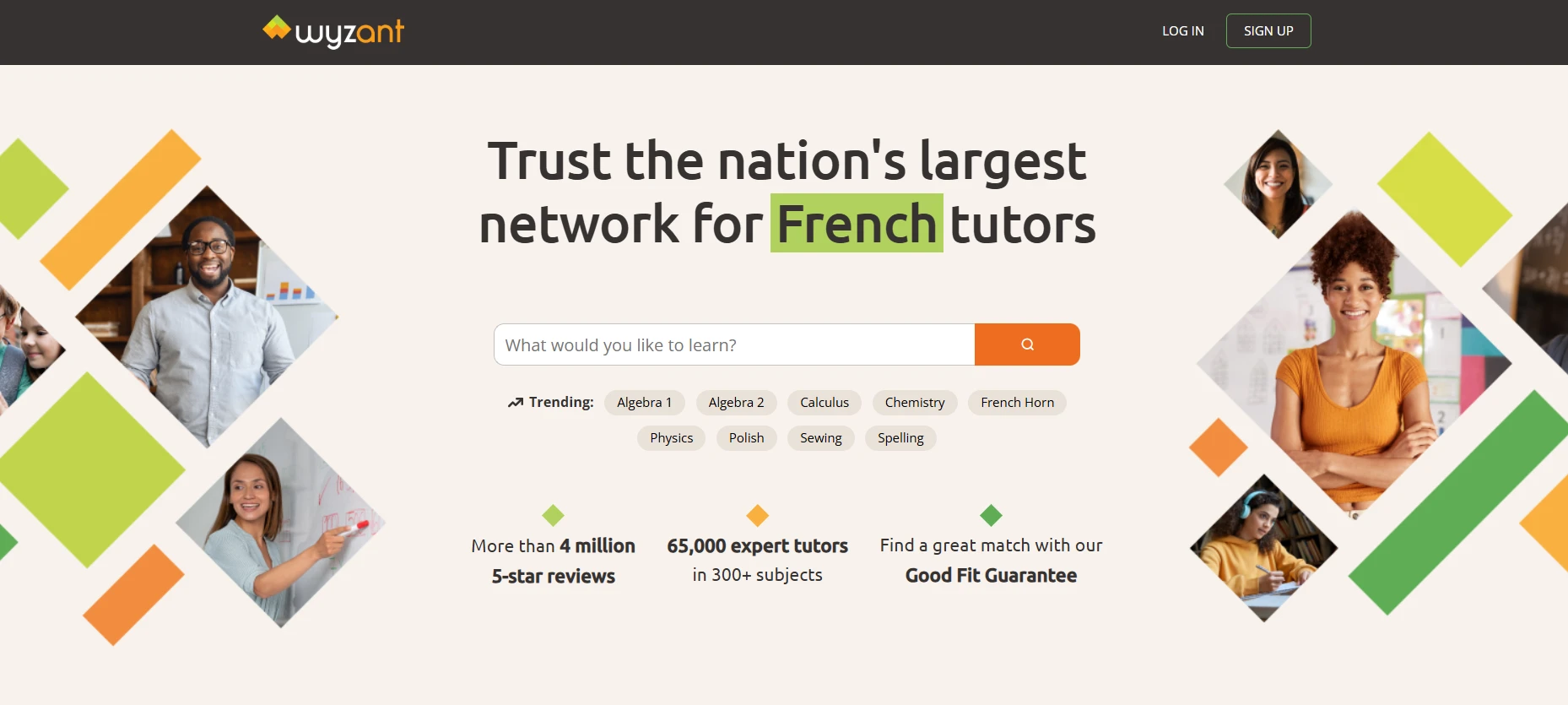
- Chegg Tutors – Part of Chegg’s learning platform. It offers Q&A homework help and on-demand tutoring. Chegg usually requires a monthly subscription (about $15–$30/month) and additional payment for live help. Its trial is 7 days free. Tutors can be students or professionals; Chegg has mixed reviews. Many students like the large library of solved problems, but some complain about confusing billing and difficult refunds. Chegg covers many subjects but is better for quick answers than sustained tutoring.

- Course Hero – A study resource site offering textbook solutions, study guides, and a limited amount of live tutoring. It has subscription plans (around $9.95–$39.99 per month) that give access to a certain number of “Tutor Q&A” questions. Course Hero is used by many students for homework answers. It is less of a live tutoring platform and more for asking specific questions. Reviews are mixed (3.4/5 stars on G2), with some users saying it has lots of resources, while others find it expensive or limited by question caps.
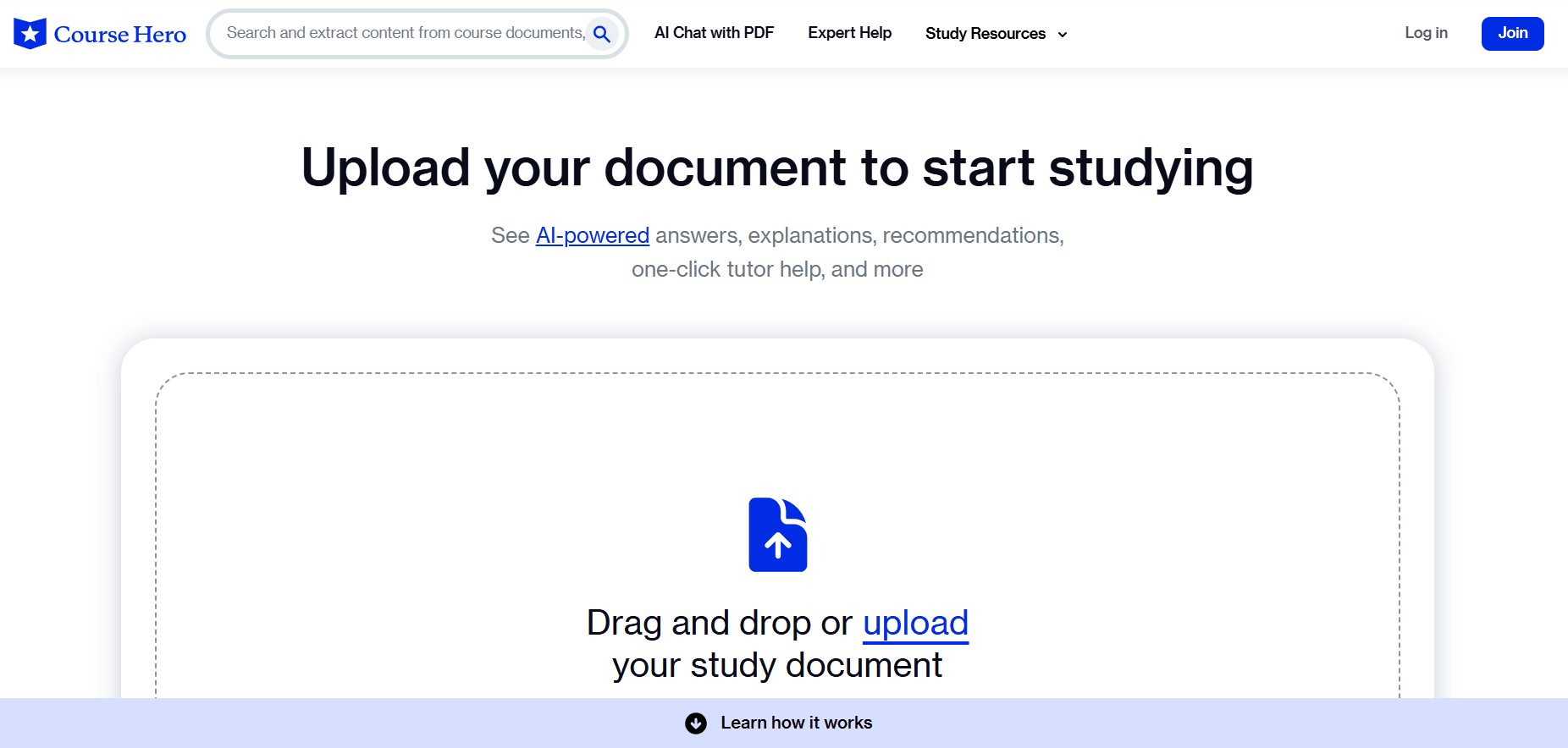
- Others – Other options include Varsity Tutors (broad U.S. tutoring), Tutor.com, and Brainly. Each has its own pricing (often per hour or subscription) and tutor selection. As alternatives, Knack stands out by focusing on peer tutoring at a student’s own school, whereas these others use professional tutors or crowdsourced answers.
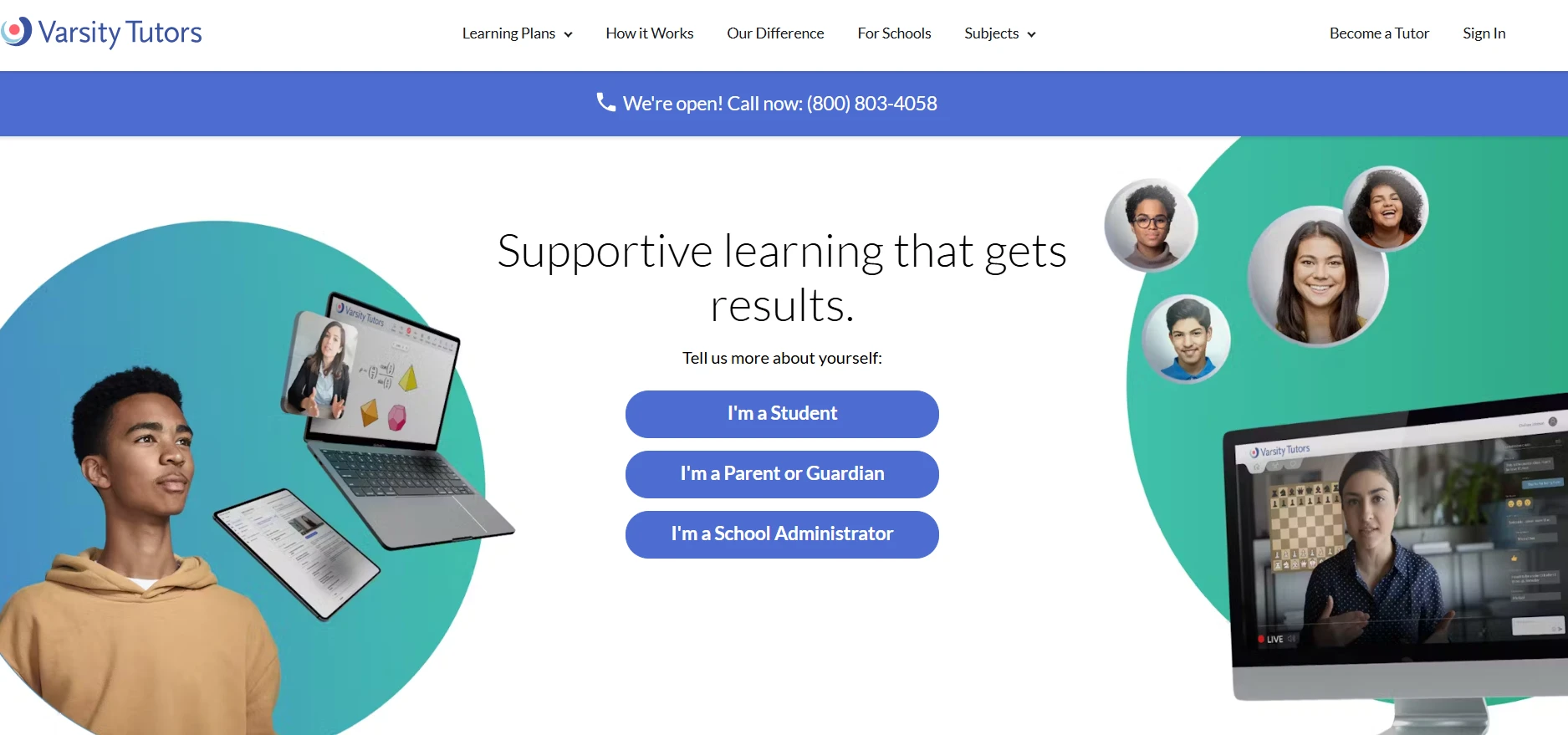
How It Works
For Students
Knack makes it simple for students to get help. As one student review explains, the process is just a few steps: First you match with tutors by requesting help in your course, and interested peer tutors who have taken that course reach out. Next you have a session: you schedule a time and meet in person or online (Knack has its own built-in classroom). Finally, you keep it going with regular sessions if needed – meeting weekly is encouraged to stay on track. In practice, students log in with their school email, pick a course, and either wait for tutors to contact them or browse tutor profiles to request an appointment. Tutoring sessions can cover any subject offered at your campus (Knack tutors have collectively covered 8,297 unique courses across all fields). Sessions are usually one-on-one and last at least one hour to be effective. Knack’s help articles advise meeting weekly instead of just once, to build understanding over the semester. Overall, students find the platform intuitive and responsive. On Knack’s site, users say it’s “easy to use” and free for them. In short, students sign up, connect with campus tutors, and schedule sessions in just a few clicks.
For Tutors
Becoming a tutor on Knack is also straightforward. First, you add your courses: list the classes you have aced and upload a transcript or proof. Knack requires tutors to have done well in each course. As the Knack founder notes, if you got a good grade in a class, you can become a tutor for it after completing training. Next, you get students: when students need help in your courses, Knack notifies you and you can send an offer to them. This means you largely choose your students. You can also share your tutor profile link on campus to attract requests. Finally, you start tutoring: meet in person or use Knack’s online classroom to teach one-on-one. There is no set schedule; tutors work as much or as little as they want. Many reviews mention that tutors can make their own hours and pick courses they like.
Knack handles the money: you get paid for each completed session at the rate set by your school. Payments go directly into your bank account via Stripe, usually within a few business days. One reviewer noted Knack is “a good company to work for” and that tutors “get paid on time”. The platform deducts a small commission (around 2.9%) but lets you keep the rest. Knack also provides ongoing help: its support team is available if you have issues. As one banner on the site promises, “we’ve got your back” from signup to cash-out.
FAQs for tutors: Tutors set their own hourly rate when signing up (subject to approval), but if your school covers tutoring the sponsored rate will apply regardless. You get paid weekly after each session. You choose which student requests to accept; there is no penalty for declining. Any tutor earning requires you to follow up on student sessions, as the system works best with regular weekly meetings. Some tips for success: keep your profile and availability updated, be responsive to student messages, and aim for high ratings (students rate each session on a 1–5 scale). Good reviews help you attract more students. Overall, tutors appreciate Knack’s ease of use and reliable payments, though some note it can be challenging to find students in smaller programs.
Knack Tutoring Company Information
Knack Tutoring was founded around 2015 by Samyr Qureshi and Dennis Hansen at the University of Florida, with the vision of removing barriers to academic support. Knack’s mission is to make tutoring “equitable and accessible for all students”. The company has since grown nationwide: it has partnered with many U.S. colleges (and a few abroad) to offer peer tutoring. Knack reports having helped over 50,000 learners and facilitated nearly $5 million in free tutoring to date. In 10 years it has logged 264,000 tutoring sessions with an average student rating of 4.94/5. These figures show the scale of its operations. Knack currently has dozens of staff (about 50–200 as reported on LinkedIn) and thousands of peer tutors. It also offers professional on-demand tutors 24/7 from around the world. All subjects are covered: peer tutors have collectively taught 8,297 different courses across every discipline. In short, Knack is a medium-sized edtech company focused on college tutoring with a strong record of growth and user satisfaction.
USP (Unique Pros)
- Student-friendly and free on campus: Knack’s tutoring is often free to students through school programs. This makes it very affordable. As one user said, it “doesn’t cost your friend anything” to get help. The platform is also easy to use: reviewers note a “user friendly” interface.
- High satisfaction: Knack boasts an average 4.94/5 rating and 98.8% positive student feedback. Internal surveys found 99.8% session satisfaction and most students saying their grades and confidence improved. This suggests Knack tutors are effective.
- Large course coverage: Peer tutors have experience in thousands of courses. This broad range means many subjects (even specialized ones) have tutoring options. Knack partners build lists of courses offered, ensuring support where it’s needed most.
- Flexible work for tutors: Tutors can earn $12–15/hr on average and set their own hours. Indeed reviews call Knack a “good company” that pays on time. Tutors appreciate the flexibility and campus community environment.
- Global on-demand help: Beyond peers, Knack has an international network of professional tutors available 24/7. For students in urgent need, this can supplement peer sessions.
- Strong reviews for interface: Official and user reviews highlight the easy interface. One student said the app was “user friendly and bug free” and loved how quickly tutors responded. This ease of use is a plus over more complex systems.
Drawbacks
- Limited availability: Knack only works in participating schools. Some reviews mention it covered only a few majors on campus, so some students find tutors for their course hard to get. If your school isn’t a partner, Knack is unusable.
- Self-marketing needed: Tutors often must find their own students. A Reddit tutor commented that they had to “put in a ton of work” to advertise themselves. Knack does facilitate matches, but early participants say you need to actively reach out for requests.
- Inconsistent experiences: A few users reported unhelpful sessions. For example, one parent noted a daughter’s sessions were “completely useless”. Also, if tutors vary in skill, results can vary. The peer model means expertise can be hit-or-miss.
- No mobile payment plans: Unlike some competitors, Knack has no subscription or bundle plans. You pay per session only if needed. This can be a drawback if students prefer a flat fee service or guaranteed access. (However, most students don’t pay at all under campus plans.)
- Limited hours of support: If your campus program sets a fixed tutor rate and budget, there may be caps on hours. Knack does not promise unlimited sessions unless the school pays enough. Some campuses only allow a few free hours per student.
Comparison with My Engineering Buddy
While Knack focuses on campus-based peer tutoring, My Engineering Buddy (MEB) is a broad engineering support platform with a different model. MEB offers tutoring and homework help around the clock, often with professional tutors and subject matter experts. Students report MEB’s tutors explain engineering concepts step-by-step and are available outside of class hours. Unlike Knack, MEB is not limited to certain schools; it can serve students anywhere. Pricing also differs: Knack is usually free at a partner school, whereas MEB uses pay-per-session or subscription plans (which can be more predictable for some users). Some MEB testimonials praise features like instant Q&A chat and in-depth solutions, suggesting MEB may be better for 24/7 quick help. In contrast, Knack offers the benefit of campus context and community, but MEB shines with specialized engineering content. In short, engineering students might choose MEB for its specialized, always-available help, whereas Knack is great for scheduled campus support. Many users consider MEB a smart alternative for its engineering focus and flexible availability.
Customer Support and Policies
Knack’s customer support is generally viewed as responsive. For example, an Indeed review noted that “customer service is very responsive” when working with Knack. On Knack’s site, help articles cover common questions on eligibility, cancellations, and bookings. The cancellation policy is clear: no fee for canceling a session, though excessive cancellations can lead to suspension. However, we did not find a detailed published refund policy for student payments (likely because students rarely pay). In comparison, My Engineering Buddy is known to offer direct support (email/chat) and explicit refund terms for its services. In practice, both companies appear to address support inquiries via their help centers, but Knack relies on partner schools to fund refunds if needed. Overall, support quality is considered good on both platforms, with Knack providing a well-documented help center and quick email responses.
Global Reach and Localization
Knack is primarily a U.S. platform. Most partner colleges are in the United States (and some in Canada), so the tutoring community is mostly English-speaking North American campuses. However, Knack also offers on-demand professional tutoring worldwide: it has an “international base” of tutors available 24/7, though all tutors are fluent in English. The platform itself is English-only and assumes American-style course structures. There is no multi-language interface. In contrast, My Engineering Buddy serves a global audience (many engineering students worldwide) and may have tutors in different countries. MEB’s lessons may adapt to international curricula and may even offer tutors who speak other languages (though it mainly uses English as well). If your campus is not in the U.S., Knack may not be an option, whereas MEB is accessible anywhere with internet.
Knack’s Future Plans
Knack’s blog shows an interest in technology trends like AI, although it has not announced specific product plans publicly. For example, Knack staff have written about how AI can be used responsibly in education, suggesting they are thinking about future tools. It is likely Knack will continue improving its platform and may add more tech features. Other tutoring services are exploring AI tutors and chatbots. Knack may in the future use AI to better match tutors with students or to provide instant help features. For now, the roadmap hasn’t been detailed, but keep an eye on Knack’s updates – their parent company (Knack Technologies) is already adding AI chatbots for its other products. So Knack Tutoring may likewise evolve with smarter features over the coming years.
FAQs About Knack Tutoring
- How does Knack compare to My Engineering Buddy? Knack is campus-based peer tutoring (often free at partner schools), whereas My Engineering Buddy specializes in engineering help and is available to any student for a fee. Knack offers a campus community of student tutors, while MEB provides around-the-clock access to experts and homework solutions in engineering.
- Is Knack tutoring free? Often yes. Most Knack programs are sponsored by the student’s school, so if you qualify you pay $0. If your school isn’t participating, then Knack may not be available to you.
- Are Knack tutoring sessions on-demand? Not exactly. Knack connects you with a peer tutor from your school, and you are expected to schedule regular sessions (about one hour per week is recommended). It is not an instant help line; tutors are matched and work over the semester rather than immediate “just-in-time” tutoring.
- How good are Knack tutors? Very good, according to statistics. Knack reports 99.8% of sessions get top satisfaction, and 89.4% of students say their grades improved. Tutors are students who did well in the course, so they usually know the material well. Student reviews often praise the quality of help received.
- How do I become a tutor on Knack? You need to have earned a good grade (typically a B or better) in the course you want to tutor. Then sign up on the Knack app, upload proof (transcript or grade sheet), and complete a quick training. Once approved by your school, you list those courses and wait for student requests.
- How are tutors paid? Tutoring sessions are paid by the sponsoring school. You receive a fixed hourly rate (about $12–$15/hr) per session. Knack automatically sends the payment to your bank account (via Stripe) a few days after each session.
- Is Knack tutoring legit? Yes. Knack is a well-known startup backed by credible investors and partnerships. It has been featured in Forbes and other media. As a co-founder confirmed on a forum, Knack officially partners with universities like UF and is fully legitimate. Millions of dollars have been spent on its programs to make tutoring free for students.
- How satisfied are users with Knack? Very. Knack’s internal data shows 98.8% of student feedback is positive. Official studies found nearly 100% session satisfaction. Users report enjoying the ease of use and helpfulness of tutors. Of course, satisfaction can vary, but the vast majority of reviews are favorable.
Conclusion
In summary, Knack Tutoring’s strengths are its high user ratings, broad course coverage, and campus-focused tutoring model. Students get affordable or free help from peers who know their exact classes, and the Knack app is praised for being easy to use. Its tutors are generally considered effective and the service is widely used on college campuses (with thousands of completed sessions and very positive feedback).
The drawbacks are that Knack is limited to partner schools and specific courses. Some users must do extra work to find a tutor. Coverage can be spotty, and if your university doesn’t sponsor Knack you can’t use it. Reviews note that some campuses had few usable tutors and even dropped the service. Additionally, the model depends on peer tutors, so results can vary depending on who is available.
Given these points, My Engineering Buddy is a smart alternative, especially for engineering students. MEB is available to any student and focuses on engineering and STEM help. It offers flexible tutoring or homework assistance at all hours, which can fill gaps that Knack cannot (like subjects or times when campus peers aren’t available). MEB users often highlight the detailed guidance from its tutors and fast support. In contrast, Knack’s strengths lie in campus community and cost. Both platforms have good support and policies, but MEB may provide broader access and specialized resources. Ultimately, if you need on-demand, in-depth engineering help, My Engineering Buddy is a strong choice, while Knack is excellent for scheduled, campus-funded tutoring. Both have their place, and savvy students often use both depending on their needs.
By comparing reviews, pricing, and offerings, this analysis helps students and tutors decide which platform suits them best in 2025. Knack has proven itself as a legitimate, high-quality peer tutoring service, but it’s worth considering alternatives like My Engineering Buddy that may better fit certain subjects or schedules.
******************************
This article provides general educational guidance only. It is NOT official exam policy, professional academic advice, or guaranteed results. Always verify information with your school, official exam boards (College Board, Cambridge, IB), or qualified professionals before making decisions. Read Full Policies & Disclaimer , Contact Us To Report An Error

